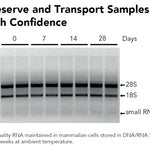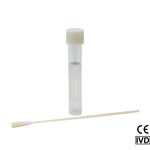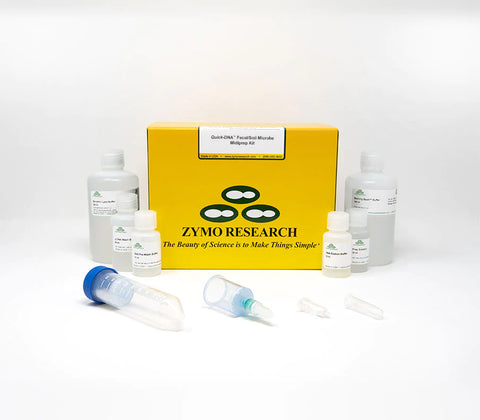Successfully Added to Cart
Customers also bought...
-
 DNA/RNA Shield (50 ml)Cat#: R1100-50DNA/RNA Shield reagent is a DNA and RNA stabilization solution for nucleic acids in any biological sample. This DNA and RNA stabilization solution preserves the...
DNA/RNA Shield (50 ml)Cat#: R1100-50DNA/RNA Shield reagent is a DNA and RNA stabilization solution for nucleic acids in any biological sample. This DNA and RNA stabilization solution preserves the... -
 DNA/RNA Shield SafeCollect Swab Collection Kit (1 ml fill) (1 collection kit)Cat#: R1160The DNA/RNA Shield SafeCollect Swab Collection Kit is a user-friendly collection kit for stabilizing the nucleic acid content of samples collected with a swab. DNA/RNA...
DNA/RNA Shield SafeCollect Swab Collection Kit (1 ml fill) (1 collection kit)Cat#: R1160The DNA/RNA Shield SafeCollect Swab Collection Kit is a user-friendly collection kit for stabilizing the nucleic acid content of samples collected with a swab. DNA/RNA...
Highlights
- Rapid method for the isolation of inhibitor-free, PCR-quality DNA from fecal samples in minutes, including those from humans, birds, rats, mice, cattle, etc.
- Ultra-high density BashingBeads are fracture resistant and chemically inert.
- Zymo-Spin column and unique filtration technologies effectively removes PCR inhibitors from the DNA product.
Original Manufacturer
Satisfaction 100% guaranteed, read Our Promise
Innovated in California, Made in the USA
Highlights
- Rapid method for the isolation of inhibitor-free, PCR-quality DNA from fecal samples in minutes, including those from humans, birds, rats, mice, cattle, etc.
- Ultra-high density BashingBeads are fracture resistant and chemically inert.
- Zymo-Spin column and unique filtration technologies effectively removes PCR inhibitors from the DNA product.
Original Manufacturer
Satisfaction 100% guaranteed, read Our Promise
Innovated in California, Made in the USA
| Cat # | Name | Size | |
|---|---|---|---|
| S6010 | ZR BashingBead Lysis/Filtration Tubes w/ 0.5 mm Beads (50 ml) | 25 Pack | |
| C1021-25 | |||
| C1058-50 | Zymo-Spin III-HRC Filters | 50 Pack | |
| C1001-50 | Collection Tubes | 50 Pack | |
| D6035-1-30 | Prep Solution | 30 ml | |
| D6001-3-150 | BashingBead Buffer | 150 ml | |
| D3004-5-15 | DNA Pre-Wash Buffer | 15 ml | |
| D3004-4-16 | DNA Elution Buffer | 16 ml | |
| D3004-2-50 | g-DNA Wash Buffer | 50 ml | |
| D3004-1-250 | Genomic Lysis Buffer | 250 ml | |
Description
Performance
Technical Specifications
| Applicable For | All sensitive downstream applications such as qPCR and Next-Generation Sequencing. |
|---|---|
| Elution Volume | ≥ 150 µl |
| Equipment | Centrifuge, Vacuum Source and Manifold, Microcentrifuge, Cell Disrupter/Pulverizer w/ 50 ml Tube Adapter |
| Processing Volume | ≤375 mg feces, ≤ 5 g soil, ≤ 500 mg fungal/bacterial cells (wet weight) |
| Purity | A260/A280 nm ≥1.8. |
| Sample Source | Feces or soil |
| Sample Storage | DNA stored at ≤ -20°C. |
| Size Range | Capable of recovering genomic DNA up to and above 40 kb. In most instances, mitochondrial DNA and viral DNA (if present) will also be recovered. |
| Type | Total DNA |
| Yield | ≤ 125 µg total DNA |
Resources
Documents
FAQ
A viscous sample can indicate incomplete sample lysis. Try using less of your sample and optimize bead beating conditions (duration, speed, time) to ensure samples are thoroughly lysed. After bead beating, pellet the cell debris before moving on. Adding more Genomic Lysis buffer to the lysate can help dilute and deproteinate the sample, making the sample less viscous and more suitable for DNA recovery.
Environmental samples often contain inhibitors such as polyphenolics, humic/fulvic acids, tannins, melanins, etc. that affect downstream applications such as PCR. Once the DNA is eluted off the binding column, the DNA is then passed through the Zymo-Spin III-HRC to remove the PCR inhibitors, and the DNA is then ready for downstream applications. The Zymo-Spin III-HRC does not bind DNA, it simply removes the PCR inhibitors. The Zymo-Spin III-HRC can be purchased separately as the OneStep PCR Inhibitor Kit (D6030).
Addition of beta-mercaptoethanol is recommended to enhance sample lysis, but can be substituted with dithiothreitol (DTT, final concentration of 10 mM). However, if bead beating is optimized and lysis is efficient, the addition of BME is not necessary and can be omitted.
No additional RNase A treatment is required when processing samples within kit capacity. The selective chemistry allows for binding of double stranded DNA to the column and for RNA to flow through.
Citations
Need help? Contact Us




